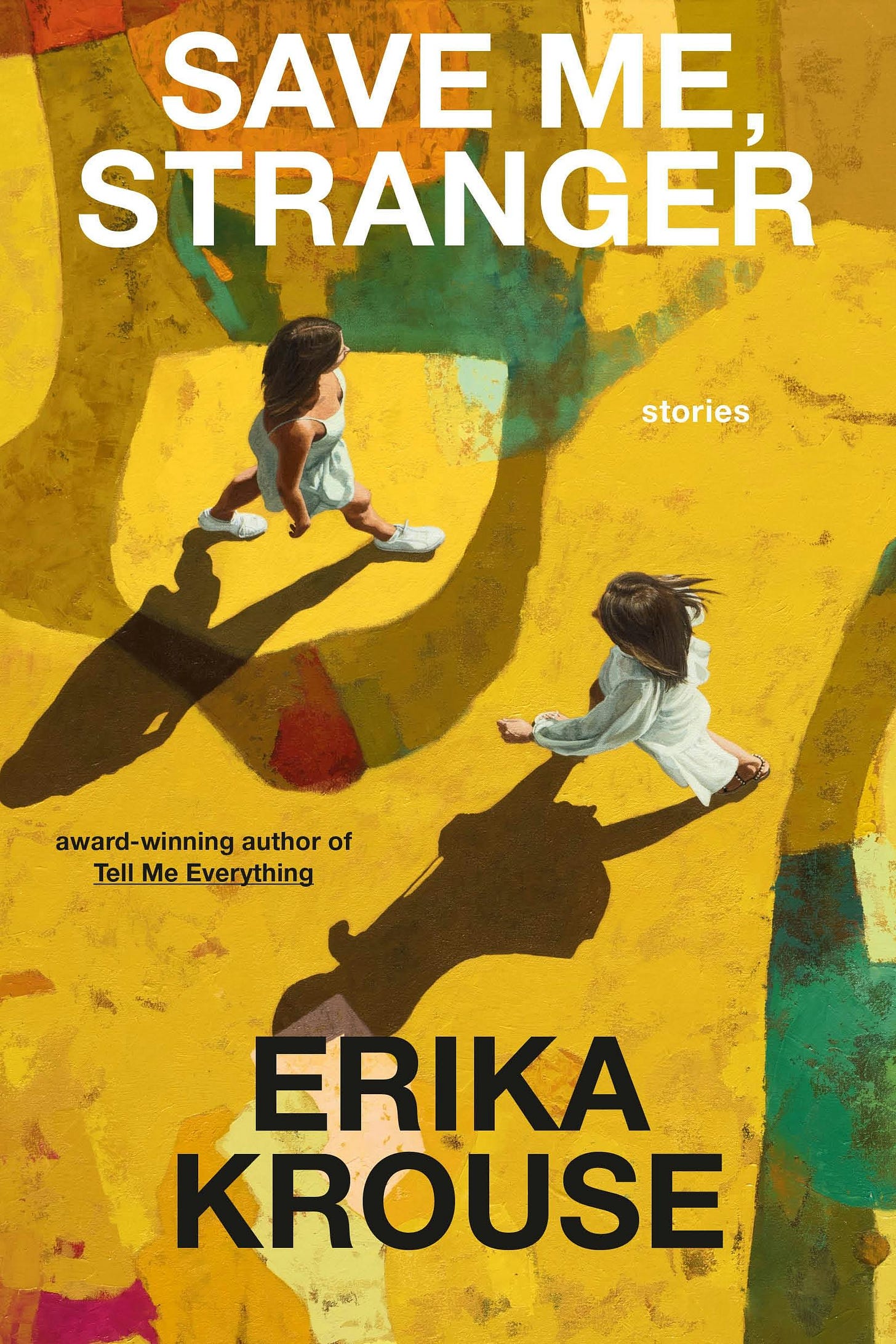'Some people may be too sane to be good writers.'
Erika Krouse's superbly detailed discussion of prose technique
Photo: David Manak
Complete our reader survey or restack this post and we’ll send you a complimentary paid subscription to Auraist.
Or click the Like (heart) button and help spread the word about the only publication set up solely to champion beautiful prose and battle the Replicant Voice.
Erika Krouse is the author of the memoir Tell Me Everything: The Story of a Private Investigation, winner of the Edgar Award, the Colorado Book Award, and the Housatonic Book Award; the story collections Save Me, Stranger and Come Up and See Me Sometime, a New York Times Notable Book and winner of the Patterson Fiction Prize; and the novel Contenders, a finalist for the VCU Cabell First Novelist Award. Krouse's fiction has been published in the New Yorker, The Atlantic, Ploughshares, One Story, and more. She teaches creative writing at the Lighthouse Writers Workshop and lives in Colorado.
We chose her story collection Save Me, Stranger as a best-written recent release. You can read the opening pages here.
In a podcast Substack’s senior staff discussed the consumption of well-written books chiefly as a form of social posturing, and wondered how they might facilitate this in Substack’s design. Are prose snobs just plain old snobs?
I don't think so! Because we're going to die someday, we can only read a finite number of books, so they'd better be good. If you're a writer but only read books at your own level or worse, you won't get any better. I tend to prioritize writers whose work has survived the test of time, rather than the hottest new thing that may actually be crap. Death looms!
When planning SAVE ME, STRANGER, to what extent did you disconnect substance from style? And when editing it?
Sometimes it's easy to get caught up in style before you've really evoked any meaning from the story. So with a first draft, I try to write what Hemingway called "true" sentences, focusing on substance and meaning.
Then, during revision and editing, I try to see what I can get away with stylistically! That's when I read everything aloud and play with pacing and syntax. I'm usually going for seamlessness and immersion in the story, but there are moments when I want to use style to make a reader pause… It's a tenuous dance.
Style often sends us in new directions during a first (or second or third) draft, and I like to follow those leads, too. I can think of particular moments in Save Me, Stranger when I let a particular sentence derail the story—moments of sudden direct address to change a story's meaning, or a funny question leading to a plot twist. I think those moments keep a writer open to possibility.
How close did you come to headbutting your keyboard in frustration at the minuscule nature of the prose issues you were working on in SAVE ME, STRANGER, and what were those issues?
Good grief, so many issues. I have a tendency to repeat words, use too many commas, overuse "that," and I even overuse "the". I equivocate. I overuse adjectives (I love Melville), qualifiers, and prepositions.
Some ideas are like Jenga puzzles and it's hard to remove excess verbosity without the idea collapsing. I'm always struggling to balance narrative expanse with narrative weight. I'm mortified at my unchecked lazy writing when I catch it too late. It's the prospect of shame that makes me hate editing, but the shame also makes me spend a lot of energy on it.
(Continues below)
Is this headbutting business why hardly any writers obsessively polish their writing?
I think many writers omit this important step because they don't understand the importance of working on their sentences and paragraphs. Many writers I teach have two phases of writing: they spit out a first draft, and then they spell-check it (and some don't). They believe "good" writing is performative, emerging flawlessly in that first draft, as if genius can only be manifested through ease.
Or maybe it's a matter of discomfort, because obsessively polishing sentences isn't a great way to spend a sunny afternoon. Some people may be too sane to be good writers.
Many readers who no longer buy novels cite their inability to fully immerse themselves in fiction, to suspend their disbelief. How important are voice and style in SAVE ME, STRANGER to casting the fictional spell that helps such immersion?
I tend to rely heavily on voice in my short fiction; I usually only begin a given story once I hear a distinctive voice that wants to tell that story for a particular reason. That's the biggest reason that all the stories in Save Me, Stranger feature a first person voice.
Short fiction uniquely offers the opportunity to use heavy voice and first person; you can't often sustain such a voice over a novel or memoir without a reader potentially getting sick of it.
Humanities departments discourage humanity in academic prose, resulting in billions of pages of appealing subject matter ruined by writing engineered to contain minimal personality, i.e. to read like a machine’s. This never seems to change. Why?
I think creative writing requires a certain degree of audacity. It's a bold act to make up a story: there's no stated informational appeal, nothing overtly adding to the human body of accumulated practical knowledge.
For this reason, creative writers rely on voice, characterization, setting, dialogue, style, and all the fun stuff. We're more individualistic, trying to make a reader feel something new and unique and human, so we can justify our story's existence.
In contrast, much of academic prose is treated as a contribution to an overall intellectual conversation, adding a facet of knowledge and perspective to a collective body. Since their ideas have to be important enough to rate this addition, perhaps the scholars are trying to seem objective in their arguments, conveying authority when they interpret a "text" in a way the author might never condone, or trying to appeal to a critical reader, arms crossed in skepticism.
And I don't know why it never changes! Most academics aspire to turn their dissertations and papers into published books, but books need to engage. It's a problem.
What ratio between writing and editing would you recommend, and has this ratio changed over time?
It depends on the project, but for me, the ratio is something like this:
- Research: 15-20%
- Writing (vomiting out hot garbage): 15-20%
- Revising (ripping things apart by the scenes, writing new stuff to plug the holes, organizing, cutting, moving things around, thinking big picture, following the dramatic questions, figuring out and expanding upon the theme, etc.): 65-85%
- Editing (words, sentences, pacing, style, voice, copyediting, building in narrative echo): 20-25%
- Crying: 5%
I know the above doesn't add up to 100%, but this is what it feels like.
For me, the ratio shifts for different genres. When I wrote a memoir, I spent more time researching (and crying), and I probably spent as much time editing as I spent revising because we had a legal read, and I had to triple-verify each fact so I wouldn't upset my own authority on the subject.
Short stories often require more research for me as well, because you have to do more concise work establishing a sense of place and culture. In Save Me, Stranger, I researched the first story ("The Pole of Cold") for over a decade.
Tell us about a tone that you feel is overused, and one that’s underused.
I'm a little sick of droll writing when it's used in contemporary prose. That was the New York style for a long time. I love this style when it comes from the era of Mavis Gallant and before, but nowadays it feels precious and tired to me.
Underused: there's a style I'm liking right now that Terese Marie Mailhot used in Heartberries: short, punchy, expositional sentences as mini-confessions. The show-don't-tell mandate banished those kinds of sentences for a long time, and I'm glad to see them reemerging.
What’s the worst piece of stylistic advice you’ve seen?
I think most standard writing advice is often misinterpreted and taken too far.
"Show, don't tell": if you describe everything, even commonplace and unimportant things, your stories will be 800 pages long, and you'll miss out on some really cool expositional sentences.
Faulkner's "Kill your darlings": your darlings are often your best work, and why would you kill that? I do think it's good to kill the favoritism itself, so you can be objective if you need to be.
And E.L. Doctorow's “[Writing is] like driving a car at night: you never see further than your headlights, but you can make the whole trip that way.” Well. That's not even a good way to drive. You'll end up in a lake, or in Ohio.
Doctorow could make the whole trip that way, but most of us need to know where we're going—what what we're writing about, and why.
“Save Me, Stranger is a book of parables—supernal and sinister. Disturbing but comforting. Read these stories with a buddy, because someone will have to scrape you off the floor.” —LOUISE ERDRICH
A Most Anticipated Book (Vulture, Literary Hub, Chicago Review of Books, SheKnows)
“An electric writing talent. Save Me, Stranger explores characters who are at hinge moments in their lives; teetering on the edge of possibility and consequence. From the coldest town on Earth, to a sex shop in Bangkok, and an ice-cream truck in gang territory, Krouse takes her readers on a globetrotting journey of survival and rapidly fading hope.”—Chicago Review of Books
COMING SOON
The best-written recent releases in literary fiction and nonfiction, and more authors answer our questions on prose style. Plus more selections from our subscribers’ submissions.
Our archive has dozens of author articles on prose style, hundreds of picks from recent releases and prize shortlists, and the best-written books of the century. A paid subscription gives you full access, or you can join the 40K+ discerning readers who’ve followed us or subscribed for free access to posts for a fortnight after publication.
Submitting work to Auraist
We offer writers a fast-growing audience of tens of thousands of discerning readers, including many world-class writers, major publishers and literary agencies, and journalists at the highest-profile publications.
If we publish your work, we’ll invite you to answer our questions on prose style. Your answers will be considered for inclusion in the print publication of these answers by many of the world’s best writers.
The following submissions are welcome:
Books published in the last year
Works serialised on Substack
Short stories
Start the process by signing up for a paid subscription below. Then email your work to auraist@substack.com. It’s recommended that you familiarise yourself with the criteria we use for our picks.
We look forward to reading your work.








I love this. There's a lot of great intel here for the new writer and the vet. And it is indeed a "bold move to make up a story."
Yeah, Ohio.